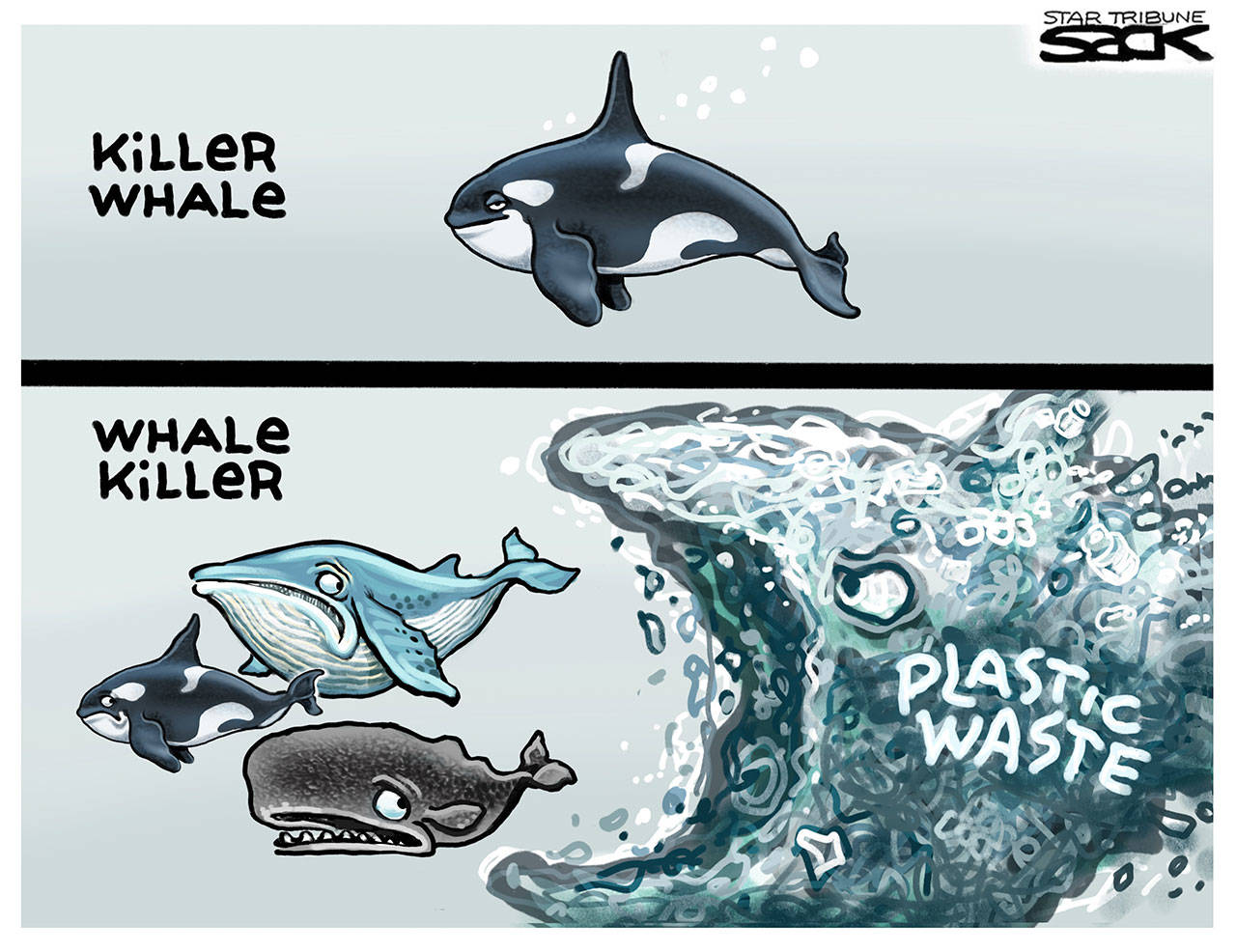By The Herald Editorial Board
Going shopping? Don’t forget your bags.
Shoppers in Everett are no longer getting single-use plastic bags to haul home their groceries; instead they’ll have the option of using their own reusable bags or pay a five-cent fee for a paper bag or a thicker plastic bag. The bag ban began Monday.
The Everett City Council passed the new ordinance in December, to encourage people to bring their own bags to stores for purchases and reduce the amount of plastic that befouls our waters, billows in trees and lingers in landfills.
Everett joins a list of about 20 other cities and jurisdictions in the state that have passed similar bans on the single-use bags that have been commonplace in grocery and other retail stores for about 30 to 40 years. Edmonds was the first city in the county to pass a similar bag ban, and has been joined by Everett, Mukilteo, Shoreline and Quil-Ceda Village in Tulalip. The state Legislature also considered a statewide ban this year, with the bill passing in the Senate, before it ran up against the session’s deadline in the House.
As handy as the bags are for carrying things — with some then lining kitchen trash bins and picking up after pets — the bags are among the most visibile targets for efforts to reduce plastic pollution. And with good reason.
A 2014 report by Scientific American found that the full range of plastic pollution — because it isn’t biodegradable but breaks down into tiny microplastics that contain and absorb toxic chemicals — are ingested by birds and marine life. A European Commission study cited by the magazine, found that 90 percent of North Sea birds had plastics in their stomachs. Another report blamed the ingestion of plastics for tens of thousands of deaths of birds and marine wildlife worldwide.
The bags aren’t the only source of plastic pollution, however, and even as legislation banning bags have grown more common — about 250 municipalities have adopted bag bans as have the states of California and New York — there remain concerns about the environmental costs of what is used in place of the single-use bags.
A look at those costs should help consumers consider what they’ll use to carry their groceries home.
The paper bags, which were the standard long before plastic bags were commonplace, are biodegradable and don’t pose the same threat to wildlife as plastic bags, but they do have a significant downside: While some recycled paper is used for pulp in making paper, it remains a process that involves heavy use of water and toxic chemicals and produces its share of greenhouse gas emissions in production and shipping.
Even the reuseable tote bags aren’t as green as they might seem, especially cotton canvas bags.
A story from earlier this spring on National Public Radio’s “Planet Money” podcast, found recent studies critical of the cotton totes. (No, the irony wasn’t lost on public radio for coming down on the cotton tote bags so popular as donation swag during fund drives.)
Noting cotton production’s contribution to greenhouse gases and heavy water use, the report pointed to studies that estimated that a cotton tote would have to be used 131 times before it made up for the impact to climate change from a single-use plastic bag. The Washington Policy Center made a similar point in 2016, citing the UK Environment Agency that estimated cotton canvas bags would have to be used 173 times to equal the impact from a single-use bag.
Surprisingly, reusable plastic bags may be the better option, and are typically right there at the checkout stand, next to the candy, lip balm and copies of People magazine.
Polyester bags need to be used 42 times to equal a single-use plastic bag. Woven polypropylene bags need to be used only 11 to 13 times to justify the switch from a single-use plastic bag.
And multiple re-use is the whole idea behind the bags.
Some will question the need for a ban on the plastic bags, especially if the state Legislature again considers a bill next year. A full look at the bag bans in Everett and elsewhere in the state and how they are changing shopping habits and how well they are reducing plastic pollution should follow.
Such a review should keep in mind that any alternative will have its own impacts to consider. But what the bag bans will do — along with reducing a significant amount of plastic waste and pollution — will serve as a daily reminder to consider how we can reduce the amount of plastic and other packaging we too easily rely on.
Talk to us
> Give us your news tips.
> Send us a letter to the editor.
> More Herald contact information.

























